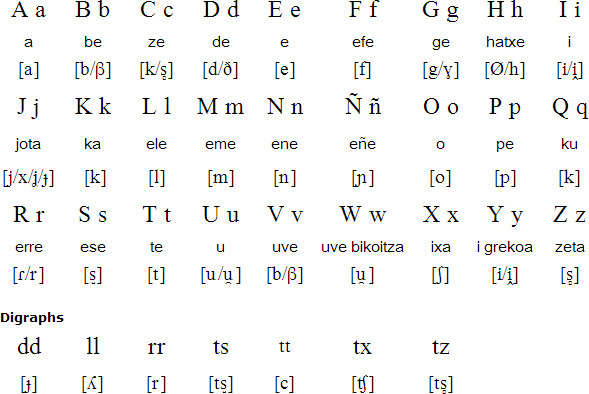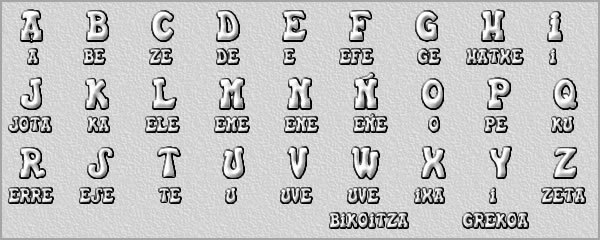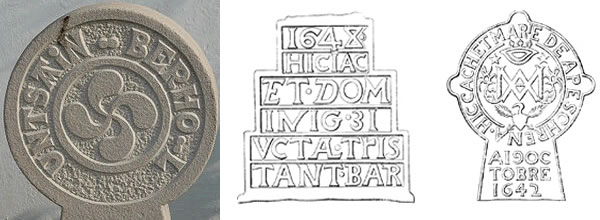Basque is a language isolate with no known linguistic relatives. It is spoken mainly in the Basque country (Euskal Herria) in the Basque Autonomous Community and the Basque-speaking area of Navarre in the northwest of Spain, and in the Northern Basque Country (Iparralde) in the Pyrénées-Atlantiques department in the southwest of France. In 2016 there were about 751,500 native speakers of Basque, including 700,300 in Spain and the rest in France.
[top]
An ancestral form of Basque known as Aquitanian appears in Roman inscriptions in Aquitaine, in the southwest of France. The inscriptions consist of the names of people and gods plus a few other words and were inscribed during the 1st and 2nd centuries AD.
Basque first appeared in writing in Latin religious texts, the Glosas Emilianenses, dating from the 11th century. The first published book in Basque was a collection of poems entitled Linguae Vasconum Primitiae, published by Bernard Detchepare in 1545.
For centuries there was no standard orthography, and Basque was written with Romance spelling conventions supplemented by various additional devices to represent sounds not present in Romance languages. In 1964 the Royal Basque Language Academy (Euskaltzaindia) promulgated a new standard orthography; this met some resistance at first but is now almost universally used.
[top]

The letters C, Ç, Q, V, W, and Y are also used, but only to write loanwords from other languages.
Download an alphabet chart (Excel)
[top]
This is a distinct style of lettering used to write Basque which developed from engravings and inscriptions. It is now used for mainly for decorative purposes. In inscriptions the area around the letters is removed, rather than carving the letters themselves, which gives them a 3D appearance.


Archaic Latin alphabet, Basque-style lettering, Carolingian Minuscule, Classical Latin alphabet, Fraktur, Gaelic script, Merovingian, Modern Latin alphabet, Roman Cursive, Rustic Capitals, Old English, Sütterlin, Visigothic Script
[top]
Gizon-emakume guztiak aske jaiotzen dira, duintasun eta eskubide berberak dituztela; eta ezaguera eta kontzientzia dutenez gero, elkarren artean senide legez jokatu beharra dute.
All human beings are born free and equal in dignity and rights. They are endowed with reason and conscience and should act towards one another in a spirit of brotherhood.
(Article 1 of the Universal Declaration of Human Rights)
Hear a recording of the whole of the UDHR in Basque
Iberiar Penintsulan bizirik dirauen erromatarren aurreko hizkuntza bakarra da euskara. Gutxitze prozesu gogorra jasan du, etenik gabe lurraldeak eta hiztunak galduz. Nafarroa Garaian bereziki, prozesu hori nabarmena da. XIX. mendearen bukaeran eta XX. mendearen hasieran, hainbat intelektual eta politikariren eraginez (Arturo Kanpion, Sabino Arana...) nolabait biziberritu zen, abertzaletasunari estuki loturik. Frankismoan (1936-1977) jazarpen latza pairatu ondoren, XX. mendearen erdialdetik aurrera hasi da indartzen, idatzizko estandarizazioari dagokionean, batez ere.
Hear a recording of this text by Unai Fernandez de Betoño
Basque is the unique pre-Roman language that survives in the Iberian Peninsula. It has suffered a dire retreat and loss regarding its speakers and territory. This process was especially notable in the High Navarre. At the end of the 19th century and beginning of the 20th century, thanks to the efforts of various intellectuals and politicians (e.g. Arturo Kanpion and Sabino Arana), the language experienced a certain blooming, widely related to the Basque nationalism. After suffering from strong persecution during the Franco era (1936--1977), it has started to make a come back during the second half of the 20th century, especially regarding the standardization of the written language.
Information about Basque | Phrases | Numbers | Time | Tower of Babel | Articles | Basque courses on: Amazon.com and Amazon.co.uk [affilate links]
[top]
Information about Basque
http://en.wikipedia.org/wiki/Basque_language
https://eu.wikipedia.org/wiki/Euskara
https://es.wikipedia.org/wiki/Euskera
https://fr.wikipedia.org/wiki/Basque
http://www.bbc.co.uk/languages/
european_languages/languages/basque.shtml
Online Basque lessons
http://polymath.org/basque.php
https://partekatu.com/
http://www.ikasten.ikasbil.eus/course/
http://asignoret.free.fr/eskuara.html
Basque phrases
http://www.ilanguages.org/basque_phrases.php
http://www.101languages.net/basque/basics.html
https://mylanguages.org/basque_phrases.php
Online Basque dictionaries
http://www.lexilogos.com/english/basque_dictionary.htm
http://www1.euskadi.net/morris/dictionary.htm
http://www.lexicool.com/dictionnaire-traduction-basque.asp
http://www.diccionarios.com
Basque Grammar
http://www.ehu.es/grammar/
Basque fonts and letter styles
https://aboutbasquecountry.eus/en/2016/09/11/a-excellent-collection-of-basque-fonts-and-more-information-on-basque-typography-iii/
http://www.basqueletters.com/Index.htm
https://es.wikipedia.org/wiki/Tipograf%C3%ADa_vasca
Basque text-to-speech
http://aholab.ehu.es/tts/
Online Basque Radio
https://www.eitb.eus/es/radio/radio-euskadi/radio-online/
Online Basque news
http://www.gara.net
http://www.berria.info
Tweets in Basque
http://indigenoustweets.com/eu/
Adaizan, Ainu, Basque, Burushaski, Candoshi-Shapra, Chitimacha, Eskayan, Hadza, Haida, Karuk, Kawésqar, Keres, Kuot, Kusunda, Kutenai, Natchez, Nihali, Nivkh, Páez, Purepecha, Sandawe, Seri, Sumerian, Tartessian, Ticuna, Tiwi, Tonkawa, Tunica, Urarina, Waorani, Warao, Wardaman, Washo, Yaghan, Yele, Yuchi/Euchee, Zuni
Languages written with the Latin alphabet
Page last modified: 30.12.23
[top]
You can support this site by Buying Me A Coffee, and if you like what you see on this page, you can use the buttons below to share it with people you know.

If you like this site and find it useful, you can support it by making a donation via PayPal or Patreon, or by contributing in other ways. Omniglot is how I make my living.
Note: all links on this site to Amazon.com, Amazon.co.uk
and Amazon.fr
are affiliate links. This means I earn a commission if you click on any of them and buy something. So by clicking on these links you can help to support this site.
[top]